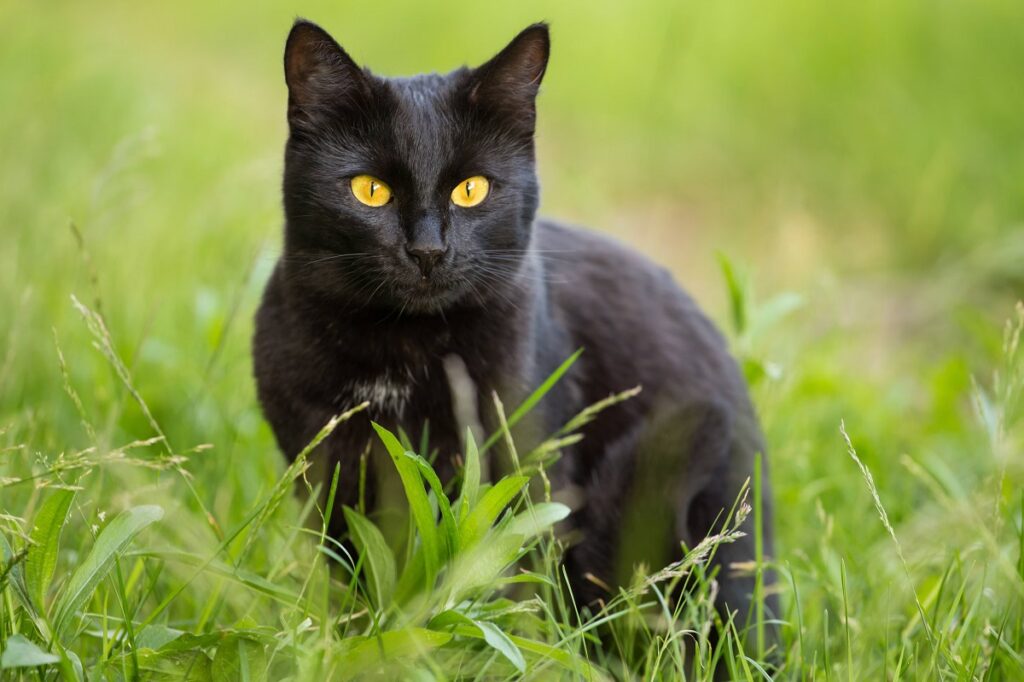Why do black cats get such a bad reputation? It’s strange how one simple color can influence how people feel about an animal. Black cats have been surrounded by myths, superstitions, and spooky stories for centuries. Some people believe they bring bad luck, while others think they are tied to witchcraft and Halloween. But where did all these ideas come from? And why do they still exist today?
In this article, we’ll dive into the history of black cat superstitions, how they affect black cats in the modern world, and what we can do to change the way people see them.
The History of Black Cats in Superstition
Black Cats in Ancient Cultures
Believe it or not, black cats weren’t always seen as bad luck. In Ancient Egypt, they were actually considered sacred! Egyptians believed black cats brought protection and good fortune, and harming one was a serious crime. Similarly, in some Celtic cultures, black cats were symbols of prosperity. They believed that a black cat showing up at your doorstep meant you were about to receive good luck.
Medieval Europe and the Fear of Witches
Things took a dark turn for black cats in medieval Europe. Around the 13th century, people started associating them with witches. Many believed that witches could shape-shift into black cats or that these animals were their magical companions. During the infamous witch hunts, both suspected witches and their black cats were persecuted, leading to mass killings of these felines.
Superstitions and Myths About Black Cats
Black Cats and Bad Luck
One of the most common myths is that black cats bring bad luck, especially if they cross your path. But did you know that this belief varies by culture? While Western superstitions often see black cats as unlucky, in places like Japan and Scotland, they are considered symbols of good fortune.
The Halloween Connection
Black cats are heavily linked to Halloween, often depicted as spooky creatures sitting next to witches or lurking in the shadows. This image has been reinforced by movies and TV shows, making people associate black cats with something eerie or supernatural. While this may seem harmless, it contributes to the stigma against black cats.
Black Cats and Omens of Death
In some cultures, black cats have been viewed as harbingers of death. Legends say that if a black cat appears on your doorstep, it could be an omen of misfortune. Some sailors even refused to bring black cats on their ships, fearing they would curse the voyage.
The Impact of Superstitions on Black Cats Today
Adoption Struggles in Shelters
Because of these myths, black cats have a harder time getting adopted. Many people still subconsciously believe in old superstitions or simply overlook black cats in favor of lighter-colored ones. This phenomenon is known as “black cat syndrome,” where shelters report that black cats are often the last to be adopted.
Pop Culture and Media Influence
Movies and TV shows have played a big role in how black cats are perceived. Think of all the famous black cats in spooky movies—Salem from Sabrina the Teenage Witch, Thackery Binx from Hocus Pocus, and even the black cat in Coraline. While these characters can be fun, they reinforce the idea that black cats are mysterious, magical, or even sinister.
The Reality vs. Myth
In reality, black cats are just as lovable as any other cat. Their fur color has nothing to do with luck or magic. Many owners of black cats say they are some of the most affectionate and playful pets out there. Science even suggests that black cats may have a genetic advantage in fighting diseases!
Changing Perceptions: How to Help Black Cats
Educating People About Myths
One of the best ways to help black cats is by spreading the truth. Sharing facts about their history and debunking myths can help break negative stereotypes. Schools, social media, and animal shelters can all play a role in educating the public.
Adopting a Black Cat
Thinking of adopting a cat? Consider giving a black cat a home! Many shelters hold special adoption events for black cats to encourage people to look past the myths. Black cats are just as loving and playful as any other feline, and they deserve the same chance at a happy life.
Celebrating Black Cats
There are even special days dedicated to changing the perception of black cats, such as National Black Cat Appreciation Day (August 17) and National Black Cat Day (October 27). Many animal lovers use these days to highlight the beauty and charm of black cats, helping them find loving homes.
Conclusion
It’s time to put the myths to rest—black cats are just as wonderful as any other cat! The idea that they bring bad luck is nothing more than an outdated superstition. While history may have painted them in a negative light, we now have the power to change their story.
If you’re ever in a shelter looking for a furry friend, don’t overlook the black cats. They might just bring you more love and happiness than you ever imagined!
FAQs
1. Do black cats actually bring bad luck?
No, black cats do not bring bad luck. This is just an old superstition with no basis in reality.
2. Why are black cats associated with witches?
During medieval times, people believed that witches had black cats as companions or could turn into them. This led to the fear of black cats.
3. Are black cats harder to adopt?
Yes, due to myths and stereotypes, black cats tend to be adopted less often than lighter-colored cats.
4. What cultures consider black cats lucky?
In Japan, Scotland, and Ancient Egypt, black cats were seen as symbols of good fortune and protection.
5. How can I help change negative perceptions of black cats?
You can educate others about the myths, adopt a black cat, or support shelters that promote black cat adoptions.

